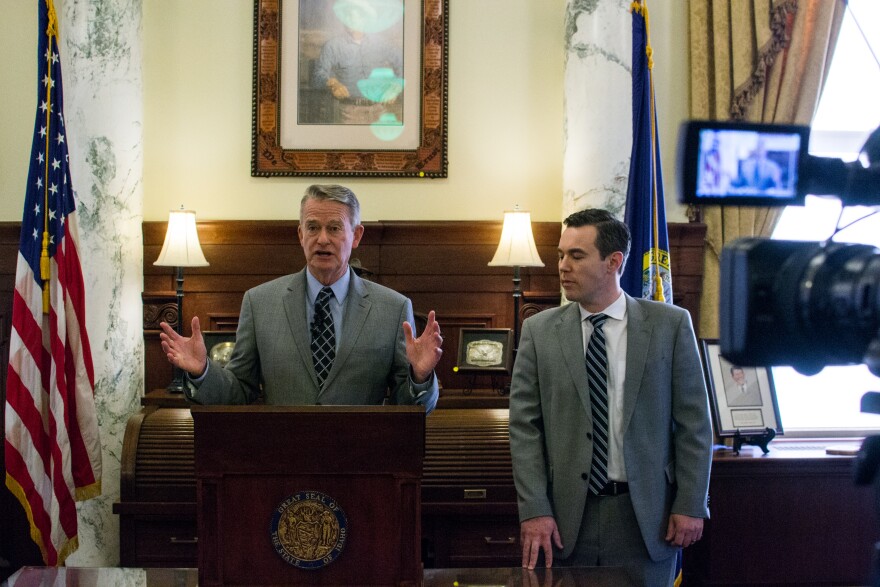Gov. Brad Little (R) faced doubts about the way his administration has handled the extra time Idaho has had to prepare for the coronavirus during a tele-town hall Tuesday.
Many of the callers during the call, hosted by AARP Idaho, questioned Gov. Little on the catch-up Idaho has had to play in ramping up its ability to test for COVID-19.
As of Tuesday afternoon, officials had tested about 350 patients out of nearly 1.8 million people who live here. Eight cases have been confirmed in a state that was one of the last to detect the disease.
With private labs now able to process these samples, the state hopes to offer more testing soon. Last week, officials said they had enough supplies to test up to 1,000 people.
A man named Kent from Nampa, who said he’s a software engineer at Boise State University, accused Little of not taking the threat of coronavirus seriously.
“Well Kent, we are taking it seriously…” Little began to say before he was cut off.
“I don’t agree. I can’t even find a place to volunteer. I tried calling your office…” the man said, before the governor replied, “Do you have a question or do you want to give a speech?”
“I want to make a speech,” he replied. “I’m ringing the alarm here as it should be rung.”
Little went on to say that places like Hong Kong and Japan have helped slow the growth of new cases through practicing good hygiene.
“No, that’s not true. Wuhan literally locked their entire province down,” Kent said, referring to the Chinese city of 11 million where scientists believe the virus began to spread.
The scientific journal Nature recently spoke to epidemiologists, who said the one flaw of the Chinese response was that quarantines and lockdowns began too late. The country first began seeing cases in December, but didn’t take any action until mid-January. “The delay of China to act is probably responsible for this world event,” Howard Markel, a public health researcher at University of Michigan, told the publication.
Models from other researchers show if the country had taken steps to contain the virus one week earlier, it could’ve prevented 67% of all cases, according to Nature. If the Chinese government had acted three weeks prior, at the beginning of January, they found it would’ve slashed the number of cases to 5% of the total.
During the town hall, Dr. Christine Hahn, Idaho’s epidemiologist, tried to calm down the caller. “We hear you; we absolutely agree with you. As the governor said, we are taking this very seriously and I’m sorry if that isn’t coming across to you clearly.”
Cities and states across the country, like New Jersey, Washington, and San Francisco have closed bars, restaurants and other businesses, or have strongly suggested nightly curfews to tamp down the spread of the disease.
So far, Idaho hasn’t taken any of those steps. Instead, it is leaving those decisions, like restaurant closures, up to local governments for now – something a caller from Coeur d’Alene asked about.
“I have no doubt that particularly some of the communities will do that and we’ll address that when we get there,” Little said, noting that a one-size-fits-all approach might not work for the entire state.
“With ramped up hygiene, with more good practices, it isn’t prudent to categorically put all the state in one area,” he said.
Another woman from Ketchum asked if the state had enough ventilators should the situation get dire.
Dave Jeppesen, the Idaho Department of Health and Welfare Director, didn’t reveal how many ventilators local hospitals had on hand, but that it was an “area of concern.” He said the state may have to tap into federal supplies through the declaration of emergency Little signed last week.
A study from Johns Hopkins University suggests there are about 160,000 ventilators available nationwide – enough to handle some outbreaks of flu that the United States experienced in the 1950s or ‘60s, but far, far short of a potential need should the coronavirus become as widespread as the 1918 Spanish flu.
Little plans to hold another press conference Wednesday morning.
Follow James Dawson on Twitter @RadioDawson for more local news.
Copyright 2020 Boise State Public Radio
Member support is what makes local COVID-19 reporting possible. Support this coverage here.




